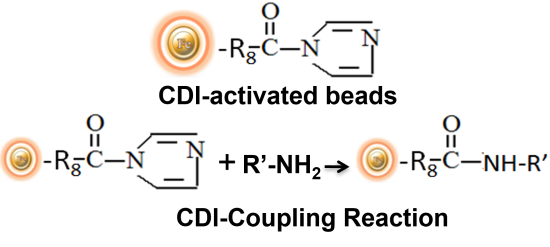- +1 858 909 0079
- +1 858 909 0057
- [email protected]
- +1 858 909 0079
- [email protected]

Products
Cat. No.
Product Name
Unit Size
Order
FW111
BcMag™ CDI-Activated Magnetic Beads Conjugation Buffer Kit
Kit Components
– Conjugation Buffer: 100 ml (100 mM, Sodium carbonate buffer, pH 9)
– Blocking Buffer: 20 ml (1 M Tris•HCl, pH 9)
– 10x Wash Buffer: 20ml (10x PBS, pH 7.2)
Each
Specification
Composition
Magnetic Bead grafted with CDI group on the surface
Number of Beads
~ 1.68 x 109 beads/mg (1μm beads)
~ 5 x 107 beads /mg (5μm beads)
Stability
Short Term (<1 hour): pH 3-11; Long-Term: pH 4-10
Temperature: 4°C -140°C; Most organic solvents
Magnetization
~40-45 EMU/g
Type of Magnetization
Superparamagnetic
Formulation
Lyophilized Powder
Functional Group Density
1μm Magnetic Beads
~250 μmole / g of Beads
5μm Magnetic Beads
~200 μmole / g of Beads
Storage
Ship at room temperature. Store at 4°C upon receipt. Do not freeze
CDI-activated support is another alternative for immobilizing amine-containing affinity ligands. When the support reacts with primary amine-containing ligands in an aqueous coupling buffer, the imidazole groups are lost, and carbamate linkages are formed. The coupling process occurs at basic pH (8.5-10); however, it is a slower reaction than reductive amination coupling with proteins. The reaction can also be carried out in an organic solvent to allow the coupling of water-insoluble ligands. Peptides and tiny chemical compounds are particularly well-immobilized by CDI-activated resins.
BcMag™ CDI-Activated Magnetic Beads is a carbonyldiimidazole affinity chromatography resin that has been activated for covalent immobilization of N-nucleophiles and primary amine ligands at pH 9 to 11 in aqueous or organic solvent conditions. It is particularly suitable for conjugating water-insoluble peptides and small organic molecules in organic solvent. BcMag™ CDI-activated magnetic beads are ideal for conjugating a large protein and peptide.

The unique dry form eliminates the need for acetone solvent storage or removal and disposal. Furthermore, because the dry resin concentrates the sample as it swells, lowering the volume of the starting material and resulting in highly effective ligand immobilization, it is perfect for coupling reactions with dilute materials.
BcMag™ CDI-Activated Magnetic Beads work perfectly as affinity resin for affinity purification to refine molecules, cells, and parts of cells into purified fractions. After conjugation with ligands, add the beads to a sample containing the target molecules, then mix, incubate, wash and elute the target molecules.

●
Reliable coupling chemistry—immobilization occurs due to the reaction of N-nucleophiles with the resin’s 1,1′-carbonyldiimidazole groups, which results in the formation of stable, uncharged N-alkylcarbamate linkages.
●
Simple to use – no secondary reagents are required; wash and equilibrate the resin in alkaline coupling buffer before adding the ligand; the reaction proceeds spontaneously
●
Stable activation – the half-life of hydrolysis is much longer than that of hydroxysuccinimide ester activations, making immobilization reactions easier to prepare and control.
Magnetic Beads Make Things Simple